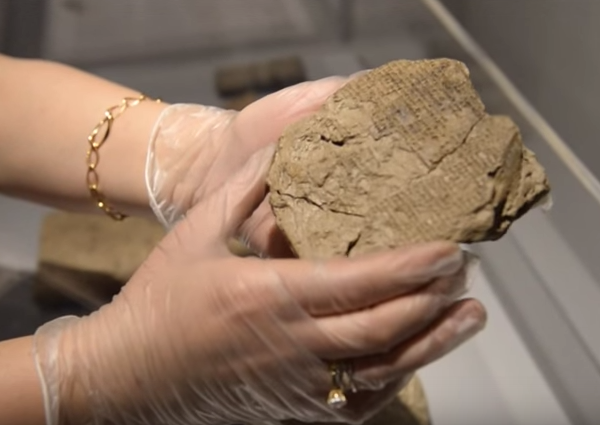20 New Lines from The Epic of GilgameshDiscovered in Iraq, Adding New Details to the Story
in History, Literature, Poetry| October 5th, 2015 13 Comments
FacebookTwitterGoogle
The Epic of Gilgamesh, one of the oldest narratives in the world, got a surprise update last month when the Sulaymaniyah Museum in the Kurdistan region of Iraq announced that it had discovered 20 new lines of the Babylonian-Era poem of gods, mortals, and monsters. Since the poem has existed in fragments since the 18th century BC, there has always been the possibility that more would turn up. And yet the version we’re familiar with — the one discovered in 1853 in Nineveh — hasn’t changed very much over recent decades. The text remained fairly fixed — that is, until the fall of Baghdad in 2003 and the intense looting that followed yielded something new.
Since that time, the History Blog notes:
the [Sulaymaniyah] museum has a matter of policy paid smugglers to keep artifacts from leaving the country, no questions asked. The tablet was acquired by the museum in late 2011 as part of a collection of 80-90 tablets sold by an unnamed shady character. Professor Farouk Al-Rawi examined the collection while the seller haggled with museum official Abdullah Hashim. When Al-Rawi saw this tablet, he told Hashim to pay whatever the seller wanted: $800.
That’s a pretty good deal for these extra lines that not only add to the poem’s length, but have now cleared up some of the mysteries in the other chapters. These lines come from Chapter Five of the epic and cast the main characters in a new light. Gilgamesh and his companion Enkidu are shown to feel guilt over killing Humbaba, the guardian of the cedar forest, who is now seen as less a monster and more a king. Just like a good director’s cut, these extra scenes clear up some muddy character motivation, and add an environmental moral to the tale.

The History Blog article has an in depth description of the translation, with links to a scholarly paper on this very important find, and prompts the question, how much more is there to be discovered?
In the video above, Hazha Jalal, manager of the tablet’s section of the Sulaymaniyah Museum talks (in Kurdish) about the new discovery, saying (in translation): “The tablet dates back to the Neo-Bablyonian period, 2000-1500 BCE. It is a part of tablet V of the epic. It was acquired by the Museum in the year 2011 and [then] Dr. Farouk Al-Raw transliterated it. It was written as a poem and many new things this version has added, for example Gilgamesh and his friend met a monkey. We are honored to house this tablet and anyone can visit the Museum during its opening hours from 8:30 morning to noon. The entry is free for you and your guests. Thank you.”
In the meantime, if you’ve got a few minutes to spare, you can click here to Hear The Epic of Gilgamesh Read in the Original Akkadian and Enjoy the Sounds of Mesopotamia.
You can also find the epic in our twin collections, 700 Free Audio Books: Download Great Books for Free and 700 Free eBooks for iPad, Kindle & Other Devices.
via The History Blog
Related content:
Hear the World’s Oldest Instrument, the “Neanderthal Flute,” Dating Back Over 43,000 Years
Hear the “Seikilos Epitaph,” the Oldest Complete Song in the World: An Inspiring Tune from 100 BC
Hear Homer’s Iliad Read in the Original Ancient Greek
Ted Mills is a freelance writer on the arts who currently hosts the FunkZone Podcast. You can also follow him on Twitter at @tedmills, read his other arts writing at tedmills.com and/or watch his films here.

